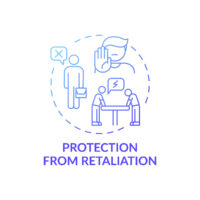Are Employees Who Testify As Witnesses In Employment Discrimination Lawsuits Protected From Retaliation?

Having represented retaliation victims for more than two decades, our Marion County, Florida workplace retaliation attorneys know that a common employment law myth is that employers are not prohibited from retaliating against employees who testify as witnesses in employment discrimination lawsuits. In far too many cases, as our Ocala, Florida workplace retaliation lawyers have learned, employees who witness workplace discrimination are afraid to testify because of the fear of retaliation. As observed by the U.S. Supreme Court in Crawford v. Metropolitan Gov. of Nashville & Davidson County, 555 U.S. 217 (2009), “fear of retaliation is the leading reason why people stay silent instead of voicing their concerns about bias and discrimination.” Because retaliatory practices dissuade employees who experience or witness workplace discrimination from speaking out, federal employment discrimination law provides broad protection against retaliation. In this article, our Marion County, Florida workplace retaliation attorneys explain how a retaliation lawsuit recently settled by the U.S. Equal Employment Opportunity Commission (EEOC) illustrates that employees are protected from retaliation when they testify as witnesses in an employment discrimination lawsuit.
Workplace Retaliation Lawsuit
In a press release issued on August 4, 2021, the EEOC announced that it has entered into a Consent Decree resolving a retaliation lawsuit against Legacy Land Management, Inc., Tams Management, Inc., Kentucky Coal Transport, LP, and Southern Coal Company. On June 4, 2019, the EEOC filed the lawsuit, U.S. E.E.O.C. v. Legacy Land Management, Inc., Tams Management, Inc., Kentucky Coal Transport, LP, and Southern Coal Company, Case No. 5:19-cv-429, in the U.S. District Court for the Southern District of West Virginia. In the Consent Decree, which was signed by U.S. District Court Judge Frank W. Volk on July 30, 2021, the four companies agreed to pay $50,000 to resolve the retaliation lawsuit.
Employee Protection From Retaliation
The EEOC brought the retaliation lawsuit pursuant to Title VII of the Civil Rights Act of 1964 (Title VII) on behalf of a former employee, Michael Atkins (Atkins), of Legacy Land Management, Inc. (Legacy Land). The EEOC maintains that Legacy Land violated Title VII by firing Atkins because he informed Legacy Land that he would be testifying against another company in an employment discrimination lawsuit brought by the EEOC.
Title VII prohibits employers from discriminating against employees on the basis of race, color, national origin, sex, and religion. In order to protect employee rights, Title VII contains an anti-retaliation provision. Title VII’s anti-retaliation provision protects employees from retaliation when the oppose perceived unlawful discrimination on the basis of race, color, national origin, sex, or religion in the workplace. The scope of Title VII’s protection against retaliation is not limited to employees who lodge internal complaints of discrimination with their employer. Instead, employees are protected from retaliation when they file a complaint with the EEOC or participate as a witness in an EEOC investigation. Employees are also protected from retaliation when they file an employment discrimination lawsuit or testify as a witness in an employment discrimination lawsuit.
Unlawful Workplace Retaliation
In April 2015, Atkins began working for Legacy Land as a coal truck driver. Before commencing his employment with Legacy Land, Atkins worked as a coal miner for Rhino Energy, LLC (Rhino). In 2014, the EEOC sued Rhino under Title VII for subjecting an employee named Jagodzinski to hostile work environment harassment and retaliation. Jagodzinski was Atkins’ supervisor at Rhino, and Atkins witnessed the unlawful harassment against Jagodzinski. In the EEOC’s investigation of Jagodzinski’s complaint, the EEOC interviewed Atkins and Atkins told the EEOC about the harassment of Jagodzinski he had witnessed while employed at Rhino.
In August 2015, Atkins learned that he would be required to testify at a deposition in the EEOC’s case against Rhino on September 17, 2015. On August 31, 2015, Atkins told his supervisor, Flick, that he needed time off from work to testify in a court case. Flick asked Atkins what the case was about. Atkins told Flick that it was an employment discrimination case in federal court and he would be testifying for his former boss who had been wrongfully fired. Flick then asked Atkins whether he was going to testify against a coal company. When Atkins confirmed that he was, Flick told him he should never testify against a coal company. In September 2015, after telling Flick that he would be testifying against a coal company in a federal employment discrimination lawsuit, Legacy Land fired Atkins.
Lawyers For Retaliation Victims
The EEOC is the administrative agency of the federal government responsible for interpreting and enforcing federal employment discrimination law. In seeking to deter employees from engaging in retaliatory practices against employees who exercise their employee rights, the EEOC brings lawsuits in federal court on behalf of retaliation victims.
In a press release issued by the EEOC on August 4, 2021 regarding the case, the Director of the EEOC’s Philadelphia District Office, Jamie R. Williamson, stated that “this settlement should remind employers that any participation in a Title VII proceeding is protected activity, whether the proceeding involves a person’s current employer or an employer from his past.” “Employers must not retaliate,” Mr. Williamson emphasized, “against employees for speaking up about unlawful discrimination.”
Marion County Workplace Retaliation Lawyers
Based in Ocala, Florida and representing employees throughout Central Florida, our Marion County, Florida workplace retaliation attorneys have fought for the rights of retaliation victims for more than two decades. If you have been retaliated against for exercising your employee rights or have questions about your protection from retaliation under federal employment discrimination law, please contact our office for a free consultation with our Ocala, Florida retaliation lawyers. Our labor law attorneys take retaliation cases on a contingency fee basis. This means that there are no attorney’s fees incurred unless there is a recovery and our attorney’s fees come solely from the monetary award that you recover.